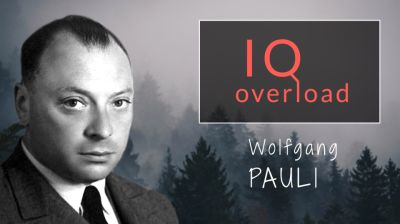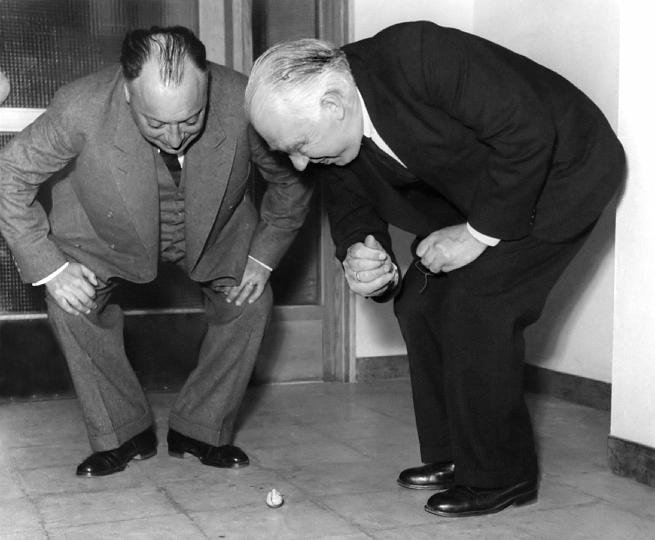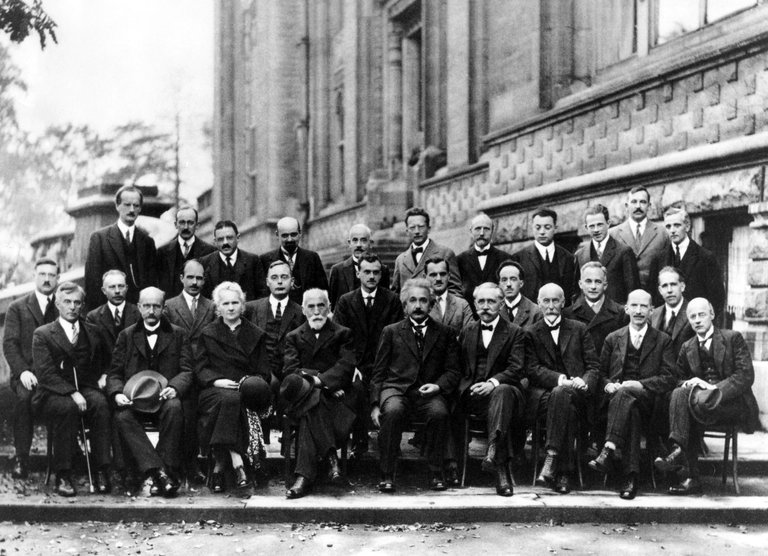
Nope electron, you can't occupy this state!

Paul Dirac, Wolfgang Pauli and Rudolf Peierls
[image credits: Wikimedia]
Early years
Wolfgang Ernst Friedrich Pauli was born on 25 April 1902, in Vienna, Austria. His father, Wolfgang Joseph Pauli, was a chemist and his godfather, Ernst Mach, was a physicist and philosopher. The scientific background of Pauli's family led him to really fast career. Only two months after graduation from Döblinger-Gymnasium, he published his first paper - paper on the theory of relativity, which he had taught himself.
Soon after that, the genius started studying at the University of Munich, where he was working under Arnold Sommerfeld, who asked Pauli to review the general theory of relativity for the Encyklopädie der mathematischen Wissenschaften. The review was written two months after Pauli got his Ph.D. It turned out that the 237 pages long review was really good and even Albert Einstein himself found it great.
It didn't take long for Wolfgang Pauli to become an assistant to Max Born at the University of Göttingen and in the following year, in 1922, an assistant to Wilhelm Lenz at the University of Hamburg. In Hamburg, Pauli got his habilitation. In the meantime, he was working at the Institute for Theoretical Physics in Copenhagen. Quite dynamic years.
Contribution to quantum mechanics
A lot of the 5th Solvay Conference participants had a great impact on quantum mechanics. Wolfgang Pauli wasn't different. His impact was huge.
First of all, in 1924, Pauli proposed the existence of new quantum numbers, which could take two possible values. They were later called spins. He used them in his famous principle for which he was rewarded Nobel Prize in Physics in 1945 - the Pauli exclusion principle.
How to tell fermions what state they can occupy?

Wolfgang Pauli and Niels Bohr teaching the particle some principles
[image credits: Wikimedia]
This task doesn't seem to be easy. These tiny particles with half-integer spin, such as an electron, are disobedient. A great mind is needed here. Fortunately for us, Wolfgang Pauli knew how to talk to them: "you, fermions, cannot occupy the same quantum state simultaneously, and don't even try to discuss, do you understand?". It seemed that silence meant consent. From this time only one fermion could occupy a given quantum state at a given time.
However, the latest research says that it wasn't like that. Scientists tell that fermions never could occupy the same state at the same time and Wolfgang Pauli with his exclusion principle only formalized this behavior.
Who is right, @jakipatryk or scientists? I bet scientists :D
The letters
Wolfgang Pauli enjoyed writing long letters to his friends, such as Niels Bohr or Werner Heisenberg, both Nobel Prize winners and about both of them I have already written. In these correspondences, they discussed some advanced physics topics. These letters turned out to be a huge source of knowledge - Pauli preferred writing to his colleagues than publishing papers.
ETH Zurich, war and later years
In 1928 Wolfgang Pauli became a professor at the Swiss Federal Institute of Technology (ETH). One year before that, Pauli's mother committed suicide. This combined with divorce with his wife, Käthe Deppner, made him to psychoanalytic therapy.
Another worth to mention fact is that Pauli predicted the existence of neutrinos. It was in 1930 when he was dealing with the problem of beta decay. The experimental confirmation of existence of these little uncharged particles came 26 years later!
When Adolf Hitler with his army took over Austria in 1938, Wolfgang Pauli became a German citizen. It forced him to move to the USA, where he worked as a professor at the Institute for Advanced Study. After the war, Pauli immediately came back to Europe, where in 1949 he got a Swiss citizenship.
As I mentioned before, in the meantime Wolfgang Pauli was awarded Nobel Prize in Physics "for the discovery of the Exclusion Principle, also called the Pauli principle".
Wolfgang Pauli remained in Zurich for the rest of his life. In 1958 he got pancreatic cancer, which was the reason why he died on 15 December of this year.
Summary

Wolfgang Pauli among other great minds at the 5th Solvay Conference (1927)
[image credits: Wikimedia]
Wolfgang Pauli was one of the fathers of quantum mechanics. As the 5th Solvay Conference participant and Nobel Prize winner, he developed our civilization. Pauli thanks to his great strength told fermions how they should behave, what was called the Pauli exclusion principle. He also proposed the existence of a new quantum number - a spin. Wolfgang Pauli was also the first who predicted the existence of neutrinos.
References:
- more about Wolfgang Pauli:
- more about Pauli exclusion principle:
- more about quantum state:
- more about fermions:
0. IQ overload: the story of one photo
1. IQ overload: Maria Skłodowska-Curie
2. IQ overload: Niels Bohr
3. IQ overload: Albert Einstein
4. IQ overload: Werner Heisenberg
5. IQ overload: Erwin Schrödinger
6. IQ overload: Max Planck
7. IQ overload: Louis de Broglie
8. IQ overload: Arthur Compton
9. IQ overload: Max Born
10. IQ overload: Paul Dirac
11. IQ overload: Wolfgang Pauli
Bonus parts:
#2017 IQ overload: Barry Barish, Rainer Weiss and Kip Thorne

gif made by @rocking-dave
Do you like Science, Technology, Engineering or Mathematics? Check out #steemSTEM and join us on #steemSTEM chat!
Pauli also had a long correspondence with the psychologist Carl Jung! I saw this blog post by Brain Pickings on Twitter and ordered the book on Amazon... I've flipped through it and thought you might find that interesting. Two incredible minds!
Loved this post, definitely checking out the rest of your series.
:)
My cat doesn't listen to me when I tell it not to occupy the sofa, and Pauli gets to order around electrons? Life's so unfair...